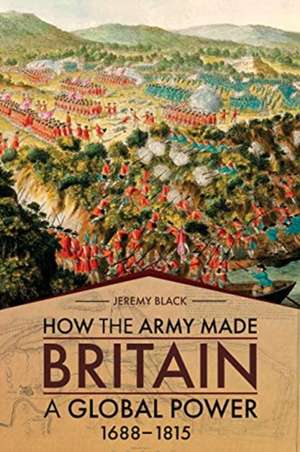How the Army Made Britain a Global Power
Autor Jeremy Blacken Limba Engleză Hardback – 23 iul 2021
The multipurpose character of the army emerges as the key point, one seen in particular in the career of Wellington: while referred to disparagingly by Napoleon as a 'sepoy general, ' Wellington's ability to operate successfully in India and Europe was not only impressive but also reflected synergies in experience and acquired skill that characterized the British army. No other army matched this. The closest capability was that of Russia able, in 1806-14, to defeat both the Turks and Napoleon, but without having the transoceanic capability and experience enjoyed by the British army. The experience was a matter in part of debate, including over doctrine, as in the tension between the 'Americans' and 'Germans, ' a reference to fields of British campaigning concentration during the Seven Years War. This synergy proved best developed in the operations in Iberia in 1809-14, with logistical and combat skills utilized in India employed in a European context in which they were of particular value.
The book aims to further address the question of how this army was achieved despite the strong anti-army ideology/practice derived from the hostile response to Oliver Cromwell and to James II. Thus, perception and politics are both part of the story, as well as the exigencies and practicalities of conflict, including force structure, command issues, and institutional developments. At the same time, there was no inevitability about British success over this period, and it is necessary to consider developments in the context of other states and, in particular, the reasons why British forces did well and that Britain was not dependent alone on naval effectiveness.
Preț: 374.00 lei
Preț vechi: 473.41 lei
-21% Nou
Puncte Express: 561
Preț estimativ în valută:
71.56€ • 74.92$ • 59.22£
71.56€ • 74.92$ • 59.22£
Carte disponibilă
Livrare economică 17-31 martie
Livrare express 28 februarie-06 martie pentru 32.24 lei
Preluare comenzi: 021 569.72.76
Specificații
ISBN-13: 9781952715082
ISBN-10: 1952715083
Pagini: 256
Dimensiuni: 235 x 160 x 24 mm
Greutate: 0.52 kg
Editura: Casemate Publishers
ISBN-10: 1952715083
Pagini: 256
Dimensiuni: 235 x 160 x 24 mm
Greutate: 0.52 kg
Editura: Casemate Publishers
Notă biografică
Jeremy Black has recently retired as Professor of History at the University of Exeter. Graduating from Cambridge with a starred first, he did postgraduate work at Oxford and then taught at Durham, eventually as professor, before moving to Exeter in 1996. He has lectured extensively in Australia, Canada, Denmark, France, Germany, Italy, New Zealand, and the United States, where he has held visiting chairs at West Point, Texas Christian University, and Stillman College. He was appointed to the Order of Membership of the British Empire for services to stamp design. His books include The British Seaborne Empire, Contesting History and Rethinking World War Two.
